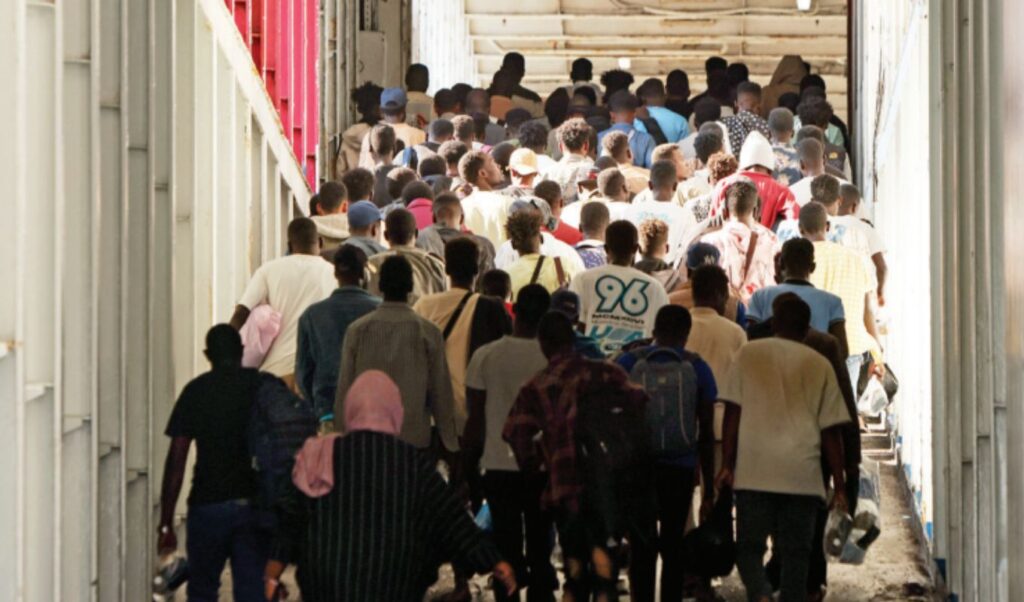The government is satisfied with the management of migration flows from Libya to Crete, which had seen an explosive increase in recent months and have now been reduced to a minimum. The next major challenge for the Ministry of Migration and Asylum is to accelerate returns, which is included in the bill expected to be voted on by Parliament in September and significantly strengthens the country’s institutional arsenal against illegal migration.
Read: Chaos in Heraklion: Patient escaped from psychiatric clinic – Stopped driver and stole her car
Specifically, officials at the Maximos Mansion believe that the country’s strict stance on managing irregular migration is yielding tangible results. Data shows that the asylum suspension amendment, tabled on July 9 with immediate effect and nearly a month in force, is bearing fruit. Within this month, a total of 913 people illegally entered the country from Libya. In other words, the number that entered in one day before the amendment’s passage now takes a full month to enter after its passage. Specifically, during the first week of July there was a peak in flows from Libya to Crete, reaching 2,711 illegal arrivals in just one week, of which 900 in just one day.
Sources from the Maximos Mansion report that the clear message conveyed to migrants in Libya – that their asylum is suspended and they are no longer hosted in facilities but under detention – combined with diplomacy with eastern Libya, resulted in zero flows from Libya.
New bill for the return of illegally residing third-country nationals
The new rules and procedures applied for the return of illegally residing third-country nationals are outlined in the new bill from the Ministry of Migration and Asylum titled: “Reform of the framework and procedures for returns of third-country nationals.” This is Thanos Plevris’ first bill, which aims to “restore order, strengthen security and regain control over Migration,” with the Greek approach serving as a “guide” in the EU for managing illegal arrivals. In this context, the proposal for creating so-called “detention and return centers” (return hubs) is gaining ground in the EU to accelerate the repatriation of irregular migrants. This is a proposal that was previously on the table, however the EU was following a milder strategy for managing irregular migration.
Return hubs outside the EU
Now, several EU countries are “turning” towards stricter migration policies and are actively discussing the positive results that would arise from the ability for member states to send irregular migrants, whose asylum applications have been rejected, to third countries with which agreements exist. Such countries that could support the creation of return hubs outside the EU include Libya and African countries like Rwanda.
The rationale behind the proposal for creating return centers outside the EU, which finds supporters from European states like Germany, is that migrants who illegally cross European borders would be transferred directly outside European territory, which would act as a deterrent to their entry into the EU. Greece supports the creation of these specific centers, and recently at the informal Council of Interior and Migration Ministers in Copenhagen, Migration and Asylum Minister Thanos Plevris supported the creation of closed facilities outside EU borders, while emphasizing the need to strengthen returns, in full alignment with the overall strategy of the Greek government implemented by Prime Minister Kyriakos Mitsotakis to address illegal migration. Regarding the operation of these specific centers, Minister Thanos Plevris emphasized that they should be established outside Europe and not just outside the European Union, but outside Europe entirely, noting that the EU should provide support to third countries where they will be created.
Plan axes
Regarding the axes that Greece follows on the front of migrant returns, it focuses on expanding the list of return countries to cover not only the country of origin, but also the country of habitual residence or some safe third country, as well as tightening penalties.
For example, remaining in the country after asylum rejection now becomes a criminal offense, with imprisonment of up to five years without suspension. “Those who are not entitled to asylum will have only two choices: prison or return,” is the central message of the Ministry of Migration. Specifically for the return of third-country nationals who remain illegally in Greece, this constitutes a radical reform of the framework, combining protection of public order with promoting a fair and effective system.
Its main axes are as follows:
1. Expansion of the list of return countries.
2. Reduction of voluntary departure time. The deadline is reduced from 25 to 14 days, while in exceptional cases from 120 to 60 days. In case of non-compliance, electronic monitoring or other restrictive measures are imposed.
3. Entry ban. For those deemed to constitute a threat to public order, security or public health, a re-entry ban is imposed for up to 10 years, with possibility of extension.
4. Strengthening the detention framework. The maximum detention period increases from 18 to 24 months, especially for security reasons. At the same time, it provides that detention is not suspended due to submission of objections or applications, to ensure the unimpeded removal process.
5. Tightening penalties for illegal stay or re-entry. The fine for illegal re-entry increases to up to €30,000. For illegal entry, imprisonment of at least 2 years is provided, which increases to at least 3 years in cases of aggravating circumstances.
6. Abolition of the “7-year” regulation. The provision for legalization of foreigners who reside illegally in the country for seven consecutive years is definitively abolished. Illegal stay cannot be converted into a right.
Published in Sunday Afternoon




